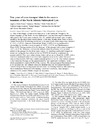Identificador persistente para citar o vincular este elemento:
https://accedacris.ulpgc.es/jspui/handle/10553/49044
| Título: | Nine years of mass transport data in the eastern boundary of the North Atlantic Subtropical Gyre | Autores/as: | Fraile Nuez,Eugenio MacHín, Francisco Vélez Belchí,Pedro López-Laatzen, Federico Borges, Rafael Benítez-Barrios, Verónica Hernández-Guerra, Alonso |
Clasificación UNESCO: | 251007 Oceanografía física | Palabras clave: | Eastern boundary Canary Current Mass transport |
Fecha de publicación: | 2010 | Proyectos: | Ctm2005-04701-C02-02-01/Mar. Origen de la Corriente de Canarias. | Publicación seriada: | Journal of Geophysical Research | Resumen: | One of the longest current meter time series in the Lanzarote Passage in the eastern boundary of the North Atlantic Subtropical Gyre has been used to determine and quantify the 9‐year mean transport, the inter‐annual and seasonal mass transport variability for the three water masses present in the area. Results show North Atlantic Central Water (NACW) flowing southward in the upper levels with a mean mass transport of −0.81 ± 1.48 Sv, Antarctic Intermediate Water (AAIW) flowing northward at intermediate levels with a mean transport of +0.09 ± 0.57 Sv and Mediterranean Water (MW) flowing southward in the deep part of the passage with a mean transport of −0.05 ± 0.17 Sv. Harmonic and wavelet analysis show the presence of a seasonal pattern in the passage for the three water masses. A maximum southward transport in winter and spring has been observed for the NACW followed by a minimum in summer and fall. Near zero values during winter and spring are found for AAIW, with a maximum northward value in summer and a negative value in fall, when this water mass reverses its flow. MW has a similar seasonal pattern to NACW. The vertical structure in the Lanzarote Passage can be approximated by four significant oscillatory modes which cumulatively explain 86.4% of the variance. The strong transport fluctuation found at the seasonal and inter‐annual timescales demonstrates that the Eastern Boundary Current transport has a strong impact on meridional overturning estimates, thus indicating that to understand Meridional Overturning Circulation variability, these transport estimates at the eastern Atlantic margin are necessary. | URI: | https://accedacris.ulpgc.es/handle/10553/49044 | ISSN: | 0148-0227 | DOI: | 10.1029/2010JC006161 | Fuente: | Journal of Geophysical Research: Oceans [ISSN 0148-0227], v. 115 (C09009) |
| Colección: | Artículos |
Los elementos en ULPGC accedaCRIS están protegidos por derechos de autor con todos los derechos reservados, a menos que se indique lo contrario.
